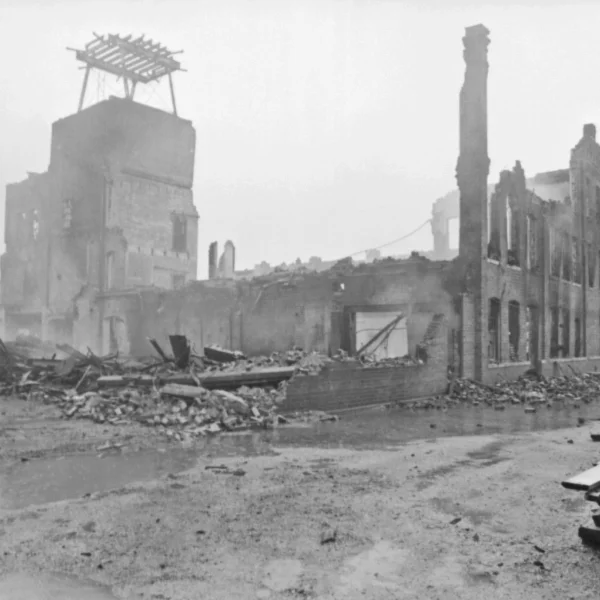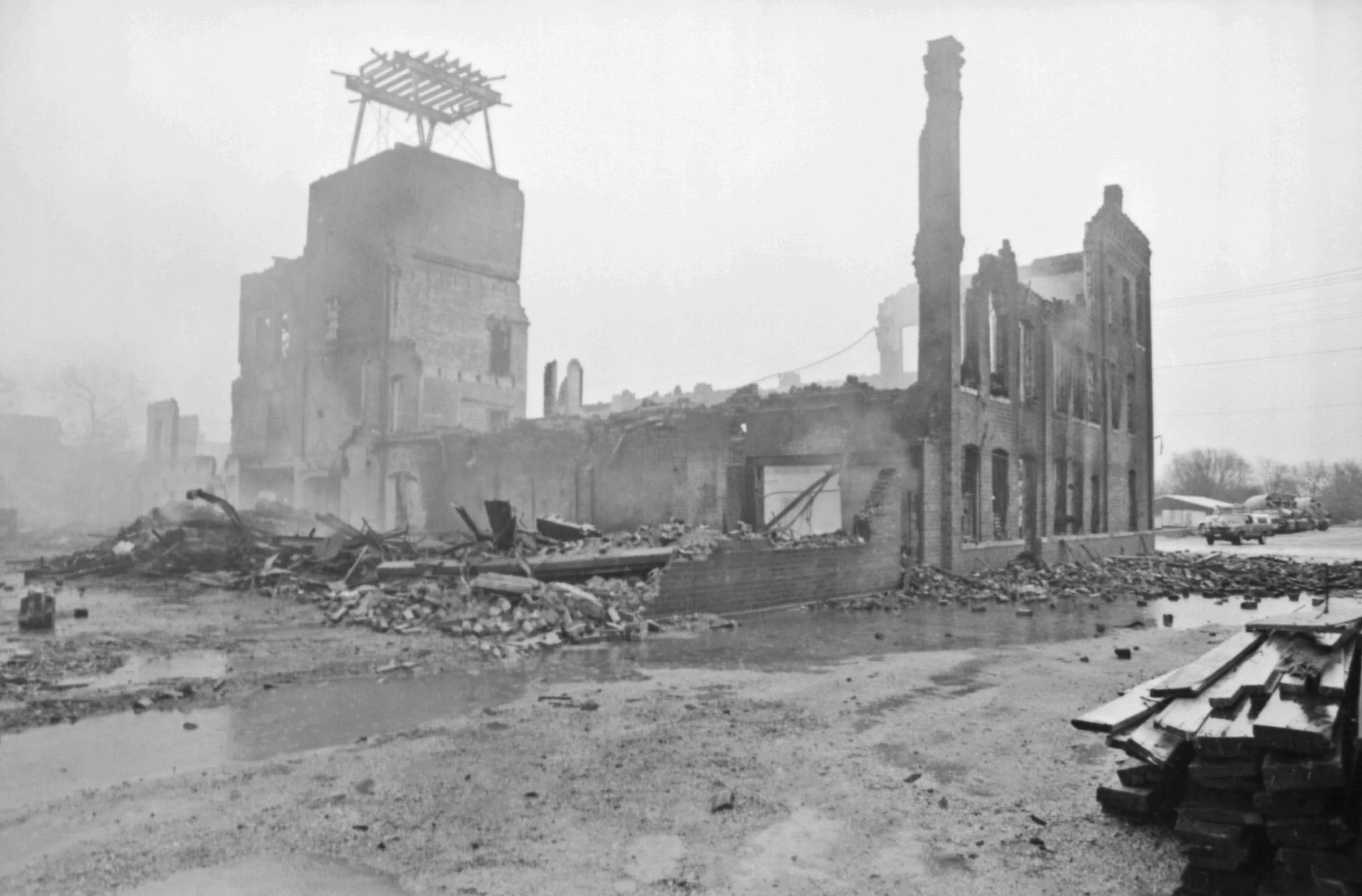In the spring of 2018, Canadian agricultural equipment manufacturer Brandt Industries began assembling grain augers and belt conveyors at its new facility along Interstate 39 north of Normal. With the likelihood of expansion and more jobs to come, the company remains one of the brighter spots in the regional economy.
In many ways, Brandt Industries is a natural fit for Central Illinois. After all, it makes sense to manufacture grain-conveying equipment in what many consider the “buckle” of the “Great American Corn Belt.”
And so it’s not surprising to learn that the Twin Cities was once home to another well-known manufacturer of such equipment, though this one, from its very beginnings, was much more of a local story.
Organized in Bloomington around the turn of the last century by G. Burt Read, Portable Elevator Manufacturing Co. became well known for its “Little Giant” line of “portable” (or wheeled) grain elevators. “With the proximity of its main office and plant facilities to one of the world’s leading agricultural regions,” noted a local business publication from the mid-1960s, “the firm has gained an intimate knowledge of the equipment needs of the American farmer.” As such, it enjoyed commercial success—both regionally and nationally—for much of the 20th century.
Back in the early 1900s, portable elevators such as the ones being made in Bloomington became increasingly important to farmers as they began storing and drying ear corn in ever-larger ventilated farm buildings known as “cribs.” Elevators—using chain-driven buckets or other means—moved ear corn, oats and other grain from wagon to crib without the backbreaking use of scoop shovels.
Portable Elevator’s factory was situated along the 900 block of East Grove Street, between the Illinois Central Railroad (now Constitution Trail) and McClun Street. An original three-story brick factory building and several later additions made for a 130,000 square foot complex. The north half of Portable Elevator’s block (the side fronting East Washington Street) featured another sizable industrial concern—American Foundry & Furnace Co. Today, this is the site of the aptly named Foundry development, which includes Green Top Grocery.
Manufacturing portable grain elevator equipment demanded precision sheet metal fabrication using press molds, punch presses and other machines. Bloomington was home to plenty of skilled machinists, what with longtime employers such as the Chicago & Alton Railroad Shops and Eureka-Williams Corp. Indeed, it’s a testament to Portable Elevator that it was able to design and manufacture quality grain elevators and other items independent of the giants in the farm machinery business, such as Case, Deere and International Harvester.
Recognized as an industry innovator, the Bloomington company made the early leap from wood to steel elevators, and eventually branched out to make Pelco-brand beverage coolers and home freezers, as well as Ideal Dispenser Co. vending machines.
Under the steady hand of W.A. Matheson, Sr., Portable Elevator became, by the early 1960s, the largest independent manufacturer of grain elevators in North American. At this time, the local workforce numbered around 100 and sales reached $2 million annually (or more than $17 million in today’s dollars, adjusted for inflation.)
It was under Matheson’s watch that Portable acquired Glencoe, a Minn.-based manufacturer of cultivators and other equipment. Glencoe’s chisel plows were popular in the 1960s as farmers sought to reduce wind and water erosion from exposed soil.
Big changes came in 1967 when Matheson sold Portable Elevator to Dynamics Corp. for 300,000 stock shares worth some $5.5 million. Matheson’s son, W.A. “Bill” Matheson, Jr., then assumed the company’s reins upon his father’s retirement. By the time the younger Matheson retired in 1984, the metastasizing farm crisis of that decade had dealt a knockout blow to many small- and medium-size equipment manufacturers struggling mightily to maintain market share.
Portable Elevator faced the same daunting challenges. In 1985, one year after the younger Matheson’s retirement, the company suspended the manufacturing of grain elevators granaries, farm gates, tillage tools and other products at its Bloomington plant.
The final blow came in early Jan. 1987, when Dynamics Corp. sold off its Portable Elevator division to Farmhand Inc. of Excelsior, Minn. The purchase price was an undisclosed amount of Farmhand stock. With the closing came the loss of the remaining 18 local jobs in administration and warehousing.
The sale also marked the end of Portable Elevator’s operations in Glencoe, Minn., as Farmhand transferred the manufacture of Glencoe tillage equipment to its main facility in Grinnell, Ia. “We’re not the first farm equipment company to consolidate,” Henry V. Kensing, vice president and general counsel of Dynamics Corp., said at the time. “Consolidations are necessary because there are too many suppliers, and farmers can’t afford to make major purchases.”
One year later, on Jan. 20, 1988, Continental Plants Corp. auctioned off what it could of Portable Elevator’s extensive inventory of property, including various presses, fabricating and shop equipment and office furniture. By that fall, Bob Thayer, a product liability specialist working out of an office on East Oakland Avenue, was the sole local employee of the Bloomington’s manufacturer’s successor.
Beer Nuts then purchased the Portable Elevator and adjacent American Foundry & Furnace Co. sites. Before it razed the foundry complex, there were plans to salvage some of the building material for the construction of New Life Tabernacle Church on Six Points Road in Bloomington.
In the end, the Portable Elevator complex suffered a fiery fate common to many old industrial buildings. In the late evening of Sat., Apr. 1, 1989, Bloomington firefighters were called to the scene when someone noticed a glow from second story windows and smoke billowing from the roof. Firefighters fought to contain the fire as high winds tossed debris onto the AB Hatchery and Garden Center.
Bloomington Mayor Jesse Smart appealed to city residents to conserve water because so much was needed to keep the fire and simmering hotspots under control.

